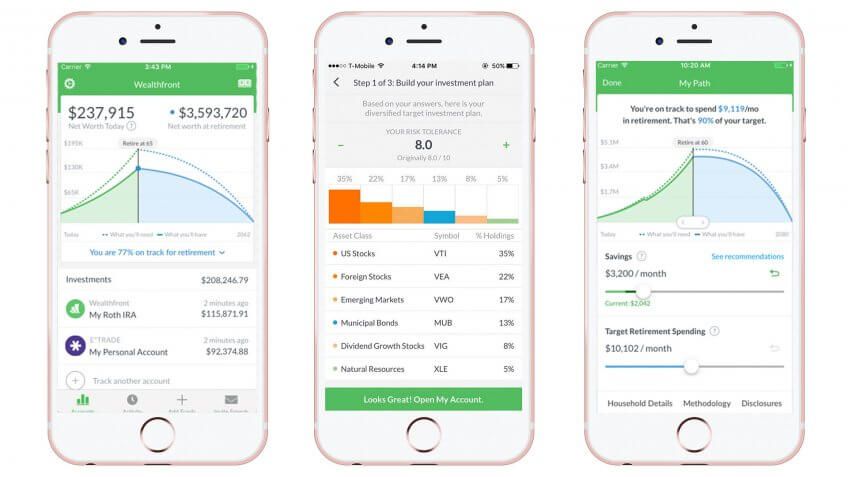Time constraints are referred to as one of the biggest obstacles for aspiring investors – and even experienced investors are trying to grow their portfolios. A packed schedule gets in the way of the research and even management required to develop a successful financial portfolio. Nowadays, the best investment apps need to solve that daunting problem by making your finances accessible straight from your smartphone.
Remember that investment apps provide you with lower fees and the convenience of making trades on the go. In this article, we will list some best investment apps that assist you in a significant way!
Table of Contents
The Best Investment Apps (overview):
These are the best apps for investment:
- Betterment: best for Robo-advisor and financial advice
- Stash: best for beginning investors
- Acorns: also best for beginning investors
- M1 Finance: best for automated investing
- Personal Capital: best for overall financial management
- Robinhood: best for stock traders
- Webull: best for individual stock
- Public: best for taking a social approach to investment advice.
- Stockpile: Best for no annual fees
- Wealthfront: best for low cost investing
- Wealthsimple: Best for socially responsible investing
All You Need to Know About The best investment apps:
Let’s take a look!
Betterment:
Betterment provides you with personalized investment options. Also, this app automates the investment process from start to finish.
How it works:
Betterment app wants to make investing effortless and even affordable for everyone. It is all based on your finances, needs, goals, and lifestyle, providing you with a personalized portfolio of low-cost index funds.
They assist you to decided how much to invest and sync with your bank – so that you have the option of regular automatic contributions. This robot-advisor helps you make financial decisions using a complex algorithm, but the great thing about Betterment is that you also can speak to a financial expert.
Pricing:
- For the standard account: $0 minimum and 0.25% annual fee
- For the premium account: $100,000 minimum and 0.40% annual fee
Pros:
- There is no need for prior experience before using this investment app.
- Simple and effortless investing
- Personalized
- Financial advisor
- Low fees
Cons:
- The rigid formula is not best for DIY-ers.
- It is only limited to managing betterment accounts.
Stash:
Stash is another easy investing app that’s accessible for everyone. You can quickly begin investing with as little as 1 cent. Remember that terms and conditions apply*
How it works:
Inspired by the weight loss industry, their philosophy behind it is making small and easy steps. This app allows you to invest in fractions of shares, which indicates that you can start with as little as 1 cent.
They provide you with a choice of roughly 1800 single stocks and ETFs. So, there you will get a lot to choose from based on your desired risk, financial situation, and lifestyle. The tremendous approach about Stash is that how easy they make the whole process. They simply explain and everything along the way, and they even provide you financial education.
Pricing:
Stash offers three different pricing plans including:
- Beginner: This plan is $1/month and provides a personal investment account, bank account access, and best financial education
- Growth: This plan is $3/month and provides you with all the features of the beginner plan, plus an account along with tax benefits for retirement investing
- Stash+: This is a $9/month plan that provides everything the other two plan offer – plus a debit card, custodial accounts (UGMA/UTMA) for up to two of your children, and even monthly marketing insights
Pros:
- Low barrier to entry
- Easy to use
- Includes financial education
Cons:
- If you are a small investor, the cost can add up.
Acorns:
Acorns enable you to choose from portfolios made by Nobel-Prize-winning economists and even automatically invest your spare change.
How it works:
Remember that Acorns links with your credit and debit card and even automatically “round up” the spare change to the next dollar on every purchase. You can also sign up for Acorns Spend and get a debit card, which will round up in real-time.
For instance, if an individual ought a latte for $3.60, he/she had automatically deposited 40 cents to his/her investment account – which can potentially sum up to quite a lot every month. Depending on your desired risk, Acorns provides you with the choice of 5 portfolio options created by the Nobel Prize-winning economist Harry Markowitz.
This is slightly different from the Betterment app, which offers custom portfolios instead of choosing a few pre-configured ones.
Pricing:
- $1 monthly fee for investing
- For $3 a month, you can also invest in a retirement savings account and simply access Acorns Spend – which gives you a debit card you can use at 55,000 ATMs. Remember that a $5 a month plan that includes all of the investing features plus Acorns Early helps you set money aside for your children.
Pros:
- Best and easy way to invest without even noticing
- No minimum balance
Cons:
- The monthly spare change may not be enough for a substantial routine investment.
- If you’re not investing enough, the $1/month fee may not be worth it.
M1 Finance Best Investment Apps:
M1 Finance provides you with automated investing in pre-selected portfolios, or even you can choose from any stock or ETF.
How it works:
M1 is meant for individuals who like the idea of automating their investments but still need some say on where their investment is going. This app enables investors to choose from any stock or ETF.
The idea of automating their investments is not restricted to their pre-selected ETFs, but M1 offers preset templates for beginners. You can also set up recurring automatic deposits weekly or monthly, or any custom time frame you desire. Best Free Streaming Sites
Pricing:
- Free of charge, only a minimum of $100 to open an account and to open a retirement account, $500 minimum
Pros:
- Provides you with an alternative to rigid robots-advisor formula
- Simple, user-friendly
- Free
Cons:
- Limited to 1 trade a day
- It can be confusing for beginners.
- No human, financial advisor
Personal Capital Best Investment Apps:
Personal Capital is the same as a personal financial manager who provides honest advice, wealth management, and free financial tools.
How it works:
Personal Capital works as an asset management service and even offers helpful free financial tools. This app dramatically links to your financial accounts to summarize your finances and even assists you in planning and budgeting your finances. There you get a bulk of features, including a handy retirement planner or bill notification.
This investment app invests your money in a preselected portfolio of individual securities and ETFs, specifically to minimize added taxes and expenses. Also, every account gets a dedicated advisor.
Pricing:
- 0.89% fee for $1 million deposited or less; you required minimum of $100,000 to start using the service
Pros:
- Affordable
- Consolidates all your financial (investment) information
- Free finance tools
- Easy to use and set up
Cons:
- High minimum
- You can’t customize your investment.
- More expensive than the most Robo-advisors
Robinhood Best Investment Apps:
Robinhood is one of the best investment apps referred to as a simple stock trading platform with no transaction fee.
How it works:
Robinhood provides you with a platform for buying and selling stocks and ETFs in real-time. The splendid part of this app is that you can invest in anything with zero transaction fees. Also, you can schedule recurring deposits if you want.
This investment app is loaded with a super simple user interface that’s easy to use. You can be able to monitor your investment performance with helpful charts and stats.
Pricing:
- Free; no minimum.
Pros:
- Free
- Easy to use
- Easy to sign up
- Perfect for investment DIY-ers
Cons:
- You must need to do your research.
- Simplest and more comfortable with making rushed uncalculated decisions.
- No recommendations for personalized investment
Webull:
Webull’s is the best and easy-to-use dashboard that allows you to build a watchlist to keep an eye on individual stocks.
How it works:
If you’re a beginner at investing, you may not at all know exactly which stocks to choose. Webull offers a graphical interface that makes monitoring stocks easy. You can even add various stores to a watchlist – and keep an eye on them for a while before adding them to your portfolio.
Webull can help you in a significant way; it doesn’t matter whether you’ve been investing for a while or you’re just getting started. The great benefit you get through Webull is education. Remember that this app will assist you in honing your skills as an investor.
Pricing:
Webull is an investment app that doesn’t charge any commissions, providing trading. However, you will be responsible for paying a margin rate if you engage in margin trading. Regulatory fees are also set for selling stocks and ETFs and prices arrested for buying and selling options.
Pros:
- Commission-free trading
- Watchlists enable you to keep an eye on assets before investing.
- The dashboard will assists you in learning more about stock performance.
Cons:
- Novices may figure out the dashboard overwhelming at first.
- You can’t be able to invest in mutual funds.
Public:
No doubt, social media has changed the way individuals communicate. The public uses that simple but great format for investing, even taking a social approach to investment advice.
How it works:
With this app, you can invest in part or all of the stock, making it easy to get started investing with even little money. This indicates that you can invest in big-name stores such as Apple and Amazon for just a few dollars.
The significant part of Public is its social media-like interface. This means you can be able to follow other investors and even share tips and insights. Over time, this sense of community will assist you in sharpening your skills as an investor.
Pricing:
The public currently provides you fee-free trading. In the future, there some premium features become, which may be offered via subscription – but nowadays, you can be able to trade without paying fees.
There are some more advanced services, which will come with a fee, these are:
- Broker-assisted phone trades – $30 per trade
- Domestic wire transfer – $30
- Domestic overnight check delivery – $35
- Returned payments – $30
- Outgoing ACAT – $75 (incoming is free)
- Paper statements – $5
- Domestic overnight mail – $35
- International overnight mail – $50
Pros:
- Social media interface encourages interaction.
- Commission-fee trading
- Invest in fractional shares
Cons:
- Available via mobile app only
- Currently, this app is only available in the U.S.
Wealthfront: FFF
Wealthfront is said to be a robot-advisor that automates everything to keep costs low. Also, you can get financial advice through the app.
How it works:
Wealthfront is the platform that looks to make you money with minimal effort from you. They create a custom portfolio for you based on your finances, goals, lifestyle, and risk level. They always try to keep costs as low as possible by strategically choosing the low-cost ETFs that minimize tax obligation.
The whole interface of Wealthfront is super simple. No complicated jargon. The investment app has excellent resources. Even it can answer your concrete questions about your goals and aspirations – like it doesn’t matter whether you can afford to take a year off to travel.
Pricing:
- $500 minimum investment, free for the first $10,000; 0.25% of an individual invested assets afterward
Pros:
- Low, straight-forward fees
- Easy to use
- Simple for new investors
- Custom portfolios
Cons:
- No face time with a financial advisor
- High minimum investment
- Stuck with rigid robot-advisor formula
Wealthsimple:
Wealthsimple is based in Canada, but even it’s available in the U.S. This app is referred to as a robot-advisor – which provides impressive investment portfolios you may not find elsewhere. These include SRI (Socially Responsible Investing) portfolios and a Halal portfolio, which entirely consistent with Islamic Halal principles.
How it works:
Wealthsimple offers three different SRI portfolio types for an individual to choose from. They include:
- Conservative: More heavily invested in Local Initiatives and even affordable housing, as those are bond funds. It crucially creates an allocation in wh8ich 65 percent of the portfolio is invested in bonds and only 35% in stocks.
- Balanced: It has an even split of 50 percent bonds and 50 percent stocks. The three different portfolio allocations not only allow you to invest in SRI – but also, you do so depends on your investment risk tolerance.
- Growth: It has a higher concentration in the stock sectors, and even particularly Low Carbon – that indicates more than 46% of the portfolio. Affordable Housing and Local Initiatives indicate just about 20% of the portfolio combined. That outcome in a portfolio mix of 80 percent stocks and 20% bonds
Pricing:
- There’s no need for a minimum investment.
- This investment app charges only 0.50% per year of account balances up to $100,000
- 0.40% per year for credits more significant than $100,000
- Remember that there is no additional cost for SRI investing.
Pros:
- Offers SRI investing
- Offers Halal investing
- No minimum investment requires
Cons:
- Higher fees than other investing platforms
- Relatively new
How do investment apps work?
Investing apps enables you to begin investing in a matter of minutes. You can find different investing apps out there to satisfy the need of all types of investors. Only a few apps assist new investors in effortlessly set up an investment portfolio from scratch. And, the others will provide you with a simple, bare-bones platform for quick low-fee trading.
The pros and cons of using an investment app:
Pros:
Simplicity for all:
Investment apps are the platforms, which empower anyone of any means or skill level to start investing efficiently. Your app can help you set up an investing account –and even offers financial advice based on your lifestyle and income.
Also, they can automate the whole process – so that you can continue building your investment without much effort.
Cheaper:
By replacing human advisors with an algorithm, apps have much lower overhead and can afford to keep their fees significantly lower. Some apps even offer free trading.
Investment apps have much lower overhead and even can afford to keep their fees significantly lower by simply: “replacing human advisors with an algorithm.” Even you can find some investment apps
24/7 access:
Gain access to your financial information, make adjustments, or buy and sell anywhere you can connect to the Internet. You don’t have to wait for the workday to start. The app works around the clock for you.
You can get 24/7 access to your financial information, make adjustments, or buy and sell anywhere using the investment app. There’s no need to wait for the workday to start. The app always works around the clock for you!
Cons:
Enables bad decisions:
The convenience of using these investment apps allows individuals to invest impulsively – instead of making a calculated investment decision.
Lacks a human element:
Although some apps provide you with the option of speaking to an advisor, many only use algorithms to assist you. Remember that what you are missing is conversations, which can depict much more nuanced information. However, advisors know about the market and provide advice that’s tailored specifically to you!
What can I trade on these apps?
Don’t fret. Individual trading options are all depending on what app you choose. Robo-advisors like Betterment only allow trading ETF. In contrast, live trading apps like Robinhood enable you to buy and sell stocks in seconds.
As you can see, all of the apps above include an option to invest in an ETF. This is because ETFs have several advantages over traditional open-end funds. Its advantages include trading flexibility, portfolio diversification and risk management, lower costs, and tax benefits. Read this article to know more about investing or starting an etf.
Final Words:
Thankfully, you come to know the best investment apps, but we recommend consulting a financial advisor before making any financial decision.










